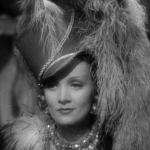 |
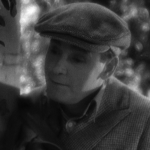 |
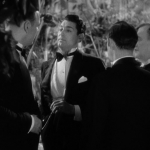 |
| Helen, AKA The Blonde Venus Marlene Dietrich |
Ned Herbert Marshall |
Nick Cary Grant |
| Released by Paramount Pictures | Directed By Josef Von Sternberg |
||
Proof That It’s Pre-Code
- There’s a bevy of beautiful women skinny dipping in the opening scene. Most seem to be wearing flesh-colored underwear for a few of the closeups, but there are a few who definitely aren’t.
- “Let me see your legs.”
[raises her dress] “Is that enough?”
“For the time being.” - A character’s nickname is Taxi. “Do you charge for the first mile?” coos Helen.
- “I wish he’d ask me for other favors, if you know what I mean…”
- Part of this movie may exploit the exoticism of racial stereotypes to titillate. Maybe just a little.
- The song “Hot Voodoo” is full of sexual euphemisms.
- A married woman takes up with a high society man to pay for her husband’s medical treatments.
- An Irish landlord threatens to punch his wife in the mouth if she doesn’t stop contradicting him.
- Song called “You Little So-and-So.”
- To keep her son away from her husband, Helen heads on the road and soon has to prostitute herself to survive. One john runs a restaurant and demands payment for food. He chomps on a cigar and smiles, “You gonna wash my dishes?”
- Dietrich makes an appearance in her famous coat and tails. While puffing on a cigarette she fondles a couple of female dancers with a devilish smile.
Blonde Venus: I Wanna Know What Love Is
“A little of you is worth a lifetime of any other woman.”
Josef Von Sternberg intimidates me. Besides the fact that the man has had books written about just single aspects of his evocative films, it seems depressingly impossible to properly encompass a film of his in 1,000 words. Or 2,000. Or probably even in many more than that.
But just because something is difficult doesn’t mean you don’t try, especially if you can figure out how to type from the fetal position. Of Sternberg’s legendary pre-Code filmography, one of his least regarded is Blonde Venus. Sandwiched in between the masterpiece / box office smash Shanghai Express and the masterpiece / box office flop The Scarlet Empress, Venus never really seems to get much attention paid to it, outside of the regurgitated clips of Marlene Dietrich’s “Hot Voodoo” number.
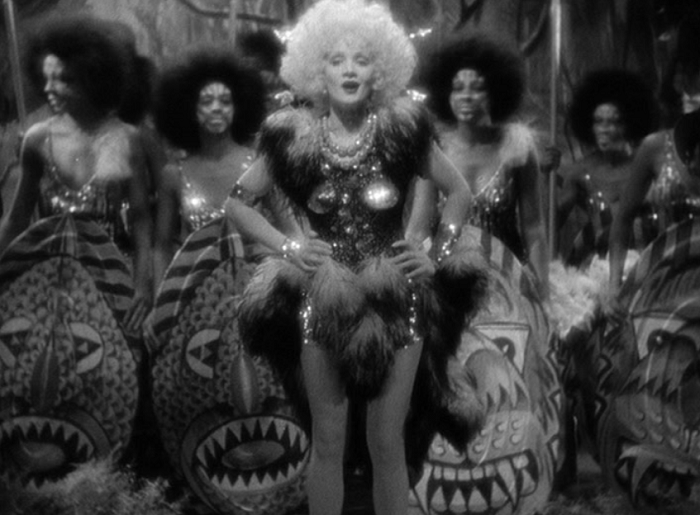
Harumph
The number is well to be remembered of course. A gorilla is dragged on the stage of a nightclub by a bevy of chorus girls in black face, carrying spears and shields. In time to the rhythm of the song, the gorilla removes its suit to reveal gorgeous Marlene Dietrich underneath. She sticks on a wicked blonde afro to complete her ornate sequined and ostrich feather outfit, and sways her hips along to the song. The lyrics, of course, are worth putting out there:
Did you ever happen to hear of voodoo?
Hear it and you won’t give a damn what you do.
Tom-tom’s put me under a sort of voodoo,
And the whole night long
I don’t know the right from wrong…Hot voodoo, black as mud.
Hot voodoo, in my blood.
That African tempo, has made a slave.
Hot voodoo, dance of sin,
Hot voodoo, worse than gin.I’d follow a cave man right into his cave.
That beat gives me a wicked sensation,
My conscious wants to take a vacation!
Got voodoo, head to toes,
Hot voodoo, burn my clothes…I want to start dancing, just wearing a smile.
Hot voodoo, I’m aflame,
I’m really not to blame,
That African tempo is meaner than mean.
Hot voodoo make me brave!I want to misbehave
I’m beginning to feel like an African queen
Those drums bring up the heaven inside me
I need some great big angel to guide meHot voodoo, makes me wild
Oh, fireman, save this child
I going to blazes
I want to be bad!
Besides how this moment trades-in on exoticism in a very Paramount manner, reading those lyrics and you wouldn’t be blamed for thinking that Blonde Venus was in the spirit of a Gold Diggers picture. A sex hungry female lead endures tribulations to be free in a world filled with condescending, cruel men, who see her body as a commodity and resent her desirability.
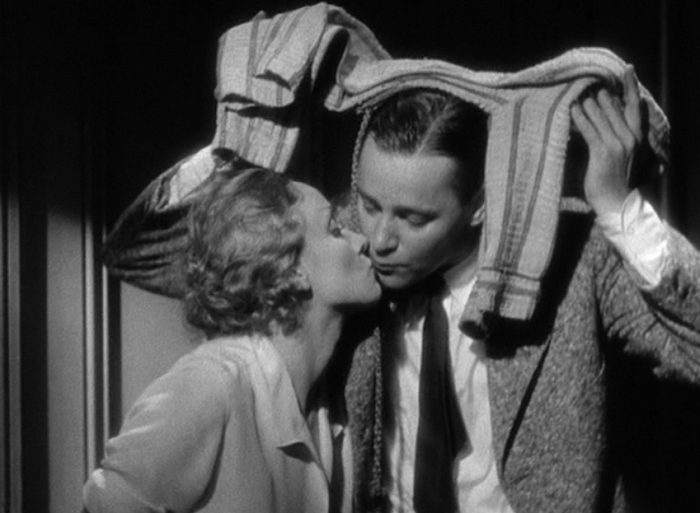
oh so hot
But that’s not quite what the movie is going for. Blonde Venus takes the women’s picture to its natural conclusion– or its origin, as the case may be. The story heavily recalls Roman myths and storytelling, from its opening to its heavily dramatic plot.
The movie opens with a nude woman swimming through a beautiful pond. We push back to reveal that there are a half dozen or so actresses skinny dipping out in the backwoods, cavorting playfully. Sternberg keeps the camera behind a willow tree, keeping the audience’s imagination turning as the girl’s frolic and play, and cheekily reminding the viewer that they are peeping. The audience is soon joined by a group of male students out on a walk, who help us get a little closer to the nubile bathers.
Among the skinny dippers is Helen (Dietrich), who will soon earn the nickname of ‘Blonde Venus’. Considering the goddess Venus was borne of sea foam, the connections between Dietrich’s character and that of her namesake are more than just cosmetic. Venus of myth was a tempering force, a woman who served as the patron of both sexual success and romantic love. But, as scholar Ariadne Staples notes (via Wikipedia bastardization), “In one context, [Venus] is a goddess of prostitutes; in another, she turns the hearts of men and women from sexual vice to virtue.”
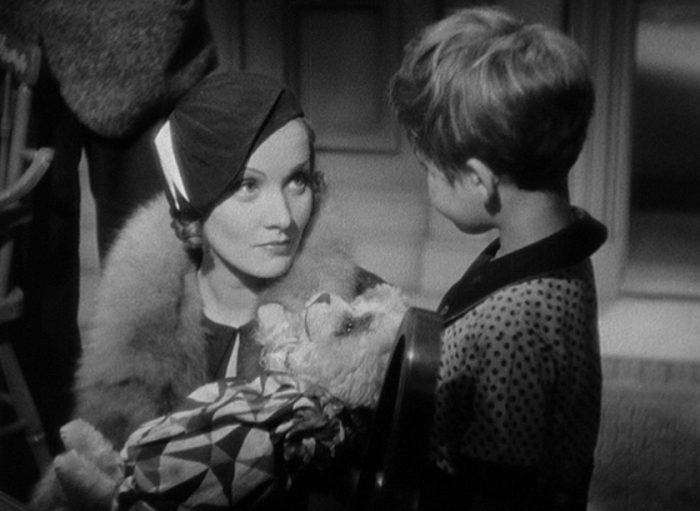
Take this sacrificial lion. You know what to do.
All of these qualities are embodied in Helen, including both a sexual desirability and an urge to moderate sexual passions. She enjoys sex, relishes it, but a desire to find and maintain love is what drives her. What Helen wants is security, and sex isn’t love.
Not very revolutionary to say nowadays, but considering the evolution of cultural norms to back when love and sex where equated, it’s potent stuff for when it was made. Helen’s life as carefree sea foam is changed when one of the leering men, Ned, offers to take her out after the night’s performance. We cut to years later where they’re both living in a New York tenement flat with a young son, Johnny. They seem romantically content, but seeing a Goddess domesticated immediately is made to feel incongruous. As for their meager livings situation, Ned is suffering from chemical poisoning from the experiments he’s been conducting. Without a voyage to Europe for treatment, he’ll die in a few months.
Helen sees no other choice to save Ned than to go back to the stage. She’s hired by a shady agent to work at a shady club where she meets another dancer– ‘Taxi’– who instantly slags her off. This is where we get to see the “Hot Voodoo” number, set in an elaborate stage production with Dietrich’s hips keeping rhythm as we go along.
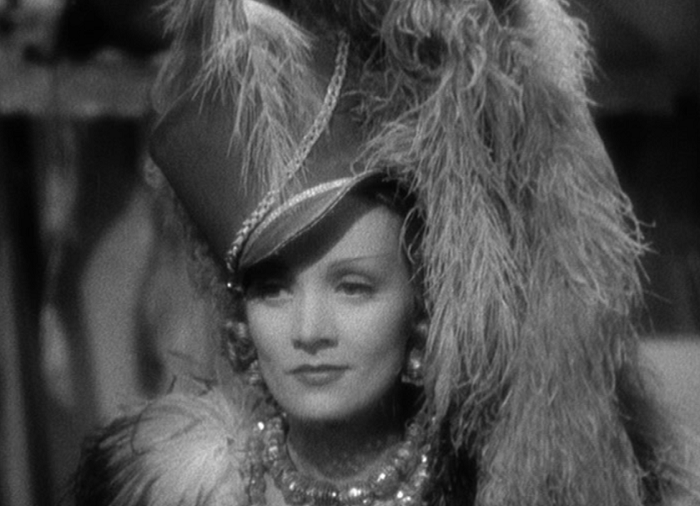
All hail the goddess
It’s during Helen’s musical numbers that she seems most interested and imbued in sex. It is here in a public place, with the music and the adoration of the crowds, that she is free. But that’s because that’s the only place a woman could sexually be free in the early 30s without scorn. As soon as you stopped singing and started luring men into the bedroom, that’s when the moral outrage would kick in.
Speaking of which, this is where Nick enters the story. He’s a charming rich man, but who’s also kind of a cad. Unsurprisingly, this is the Cary Grant role, the kind of thing he specialized in before his career really took off. There was always something wonderfully shady under Grant’s charming bravado which most of his early movies took advantage of. Some have read homosexuality into it, others have seen it as an avenue for artistic exploration– 1944’s Suspicion or 1963’s Charade, for example. This is especially true in pre-Code, where we get him in roles as ‘the other man’ in pictures like Hot Saturday or Merrily We Go to Hell.
Though he’s definitely got an edge to him, this Nick ain’t too bad of a guy. He’s at least deeply affectionate to Helen, and he offers her the money to save Ned’s life– for some affection, as you can imagine. It doesn’t hurt that Nick looks great in suits compared to Ned’s shabby clothing. And that smile! Don’t get me started!
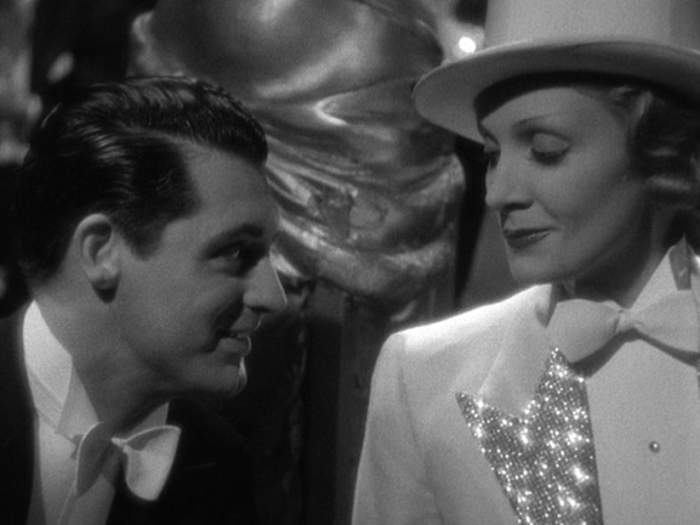
Yowza
Ned gets the treatment done in Europe, but returns early to discover Nick and Helen’s affair. Wounded, he demands she give up their son and never return. While Ned’s grateful, his pride won’t let him forgive Helen for her betrayal. Helen departs, but steals Johnny away with her; soon she’s on a cross country trek to escape the long arm of the law.
The flight is deeply evocative as things quickly downhill. Forced to avoid the stage to keep a low profile, Helen is soon simply offering her body for exchange for survival. In a lot of pictures of this type, this would be a movie of desperation with a great deal of fretting on the woman’s part; Dietrich shows none of that. She’s half trying to give off an air of calm in front of her child, half placid with the inevitable. If Venus is sex, she has no qualms using it. Sex isn’t what’s important to her, even if it seems to be the only currency a broke woman has to trade on.
Helen is eventually tracked down. When you want someone nice and slimy, there’s practically no one better to get than actor Sidney Toler, the private investigator named Wilson who has been pursuing Helen but doesn’t even recognize her when he sees her. Instead he thinks he’s about to get lucky with a prostitute. He seems a little disappointed when she reveals the truth and he’s merely solved the case instead.
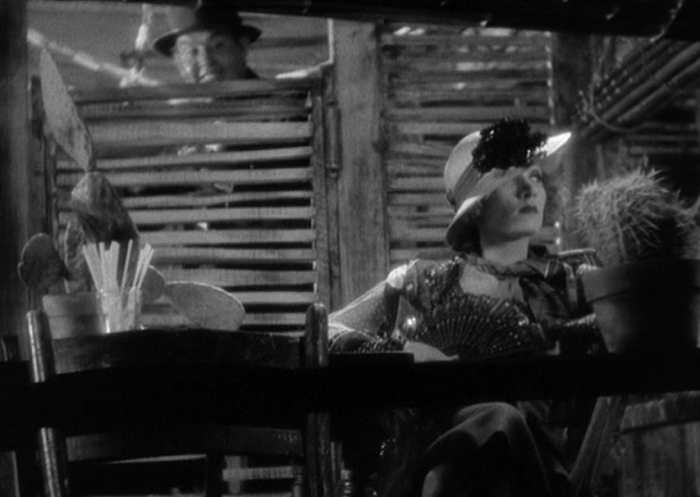
“Hello good looking!” “Hello slimy”
Considering the “Hot Voodoo” number, it’s probably worth devoting a paragraph to the film’s treatment of black characters– you know, the ones not in blackface. Unfortunately, there’s a number of stereotypes laid in here. At the bar where Dietrich performs the “Voodoo” number, a black bartender stutters his way through most of his conversations, with the implication that it may be because he’s terrified of gorillas. Helen also relies on a couple of kindly female black babysitters and confidants along her flight with Johnny. One of them, Cora (Hattie McDaniel), gets to show a little bit of foresight and cleverness as she tries to shake Wilson from Helen’s trail. These roles could be seen in two distinctive ways: as either traditional portrayals of blacks as their stereotypes (men are gutless, women are mothering), or, as it is contrasted in Helen’s storyline, illustrating how real black people actually live compared to the way that monied white culture exploited their exoticism. Honestly, I think it could be argued either way.
Helen returns Johnny to Ned because she knows that she’s hit rock bottom and is only harming her son. She meets him at the train station, and Ned has a layover of about ten minutes, during which he dresses down Helen and gives her a minute to say goodbye. The small visual clues here are excellent, from the rips and tears in Dietrich’s worn outfits to how Johnny’s overalls are now tied up on one side because a clasp has broken. As Ned comes and bitterly denounces Helen, Sternberg lets Dietrich’s eyes do most of the work. They’re large, filled with both hope and sadness as the man she once loved dismisses her and takes her son away.
Von Sternberg’s melodramatic lighting hits its peak as we approach Helen’s lowest point. She wanders into a women’s hotel filled with the lowest of the low, and she is sloshed. When one woman talks about committing suicide because she’s so poor, Helen laughs in her face. No, no, money isn’t the problem. Helen throws her an envelope of cash that Ned had thrown at her, and promises that she– she has a much better reason to end it all.
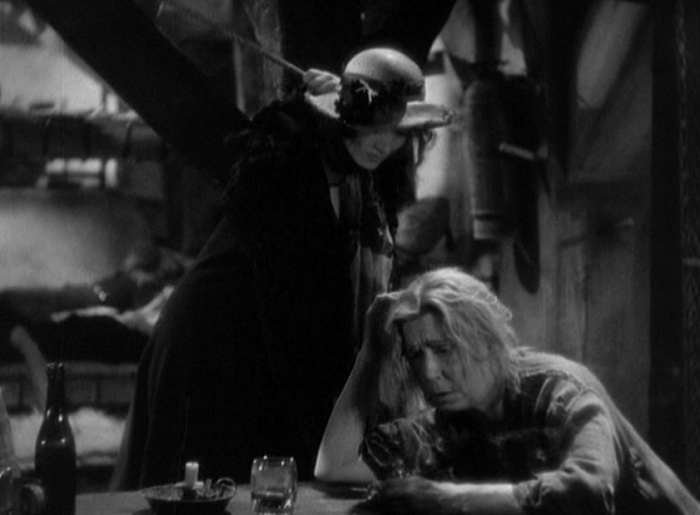
The lower depths.
Helen doesn’t kill herself, per se, but opts for suicide in a less traditional way– killing herself by becoming the very thing that her husband detested. She moves back to Europe and works her way up the social ladder, taking each and every rung that comes along. Helen hosts another stage show which again relies on open sexuality– even more so, considering the look she gives a few chorines. But she also finds Nick again, and, from his encouragement, she agrees to head back to America to find her child. It’s a showdown between Nick, Ned, Helen, and just what will happen to innocent little Johnny.
Blonde Venus is a powerhouse of a film, made by a great director at the height of his creative abilities. Besides the beautiful lighting, sumptuous cinematography, and excellent use of background music, it’s smartly edited to underline the character’s actions and choices. Everything about Blonde Venus yearns for a conclusion– it opens by presenting the viewer with beautiful, virginal Dietrich and spends its runtime following her to seek out her desire to be whole and safe again once more. It’s about the damnability of a man’s pride and a woman’s need of security, all blasted against a cold, fully realized world where women– even goddesses– are only as valuable as their bodies. Helen understands what real love is; does anyone else in the picture even come close?
The very final shot of Blonde Venus is young Johnny reaching his fingers through the bars of his crib towards a child’s toy that plays a gentle German lullaby. It’s that aching for something more than just security or lust that defines the movie, a story of how a woman’s desire to do good goes awry despite the fact that her heart never waivers. While there are lots of other pre-Code movies that tread these same fertile grounds, Blonde Venus may be the most stylish and fascinating of them all.
Gallery
Hover over for controls.
Trivia & Links
- The Acidemic Film Journal gives this one three stars, but isn’t too up on it for a number of reasons.
As a swinger in retirement, nothing gets me down like watching a layabout like Herbert Marshall use a kid to keep his hotter younger wife imprisoned in his stifling patriarchal caress du condescension. First, we’re ‘treated’ to the early days of how Marshall and Dietrich met–he and his student pals stumble on her and some friends skinny-dipping in a sparkly stream, and they proceed to leer to their heart’s content, which right there seems shitty and frat boyish. Next we see the divine M with her sleeves rolled up, bathing little Johnny while Marshall looks on, and, yeesh, you can’t wait for her to bail on them both and get back into a smooth nightclub with some folks her own age. So much as I admire it, BLONDE VENUS is my least favorite of Dietrich’s films with Von Sternberg.
- CaryGrant.net offers a number of original reviews of the film, none of which sound wholly enthusiastic. Variety noted, “it can stand plenty of chopping to speed up a sluggish procedure.” Kathy Fox comments that the film is best remembered because of one small detail: “It was while making this film that Cary’s appearance was altered when Director von Sternberg changed the part in his hair from the left side to the right, where it remained for his lifetime.”
- The Digital Fix gives a good rundown on why many people feel dissatisfied by this one:
Less sexually daring than Morocco, Blonde Venus still has its moments – Dietrich once again dons a top hat and tails, though white this time, as well as, bizarrely given what goes on beforehand, an ape suit for Hot Voodoo. It is, though, not as successful a film as the others in this set, largely because they don’t seek to punish Dietrich for her behaviour as does this. Much like, for example, Linda Fiorentina in The Last Seduction, we love Dietrich and, and a couple of generations ago, made her a star precisely for her incorrigibly lusty behaviour. When she is, as in Morocco, looking fabulous and toying with weaker men’s affections, she’s the very essence of desirability. Had the devil set himself on tempting Adam, he would surely have appeared as Dietrich – beautiful, feisty and sexually threatening.
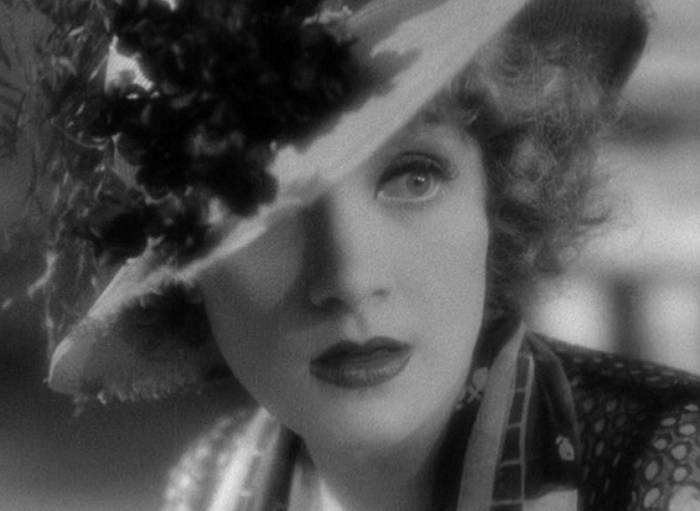
It’s all in the eyes.
- The Film Sufi has a great write-up, talking about how the different sections of the movie’s drama work together. They call Dietrich Sternberg’s “quintessential embodiment of feminine irony”, and say:
Consider the dramatic changes in Helen’s fortunes over the course of the narrative. In section 1, she is an entertainer in Germany and probably a star. In section 2, she has been just a housewife in a lower middle-class family for six years, but then returns to the stage and becomes a big star again. In sections 3 and 4, Helen is gradually reduced to penury and shame. In section 5 she is a big star again, and in section 6, she goes back to being a housewife. These events are presented over a cinematic narrative that has amazingly dramatic speedups and slowdowns over the course of its 93 minutes. For example, the tender scenes with Ned, Helen, and Johnny are evocatively slow moving (the final scene lasts nine minutes). And there are three rousing Dietrich cabaret numbers also presented in the film (in sections 2, 4, and 5) that take up about a dozen minutes. But the dramatic circumstantial rises to glory can be covered quickly, because the main focus of the story is not so much on Helen’s position in society, but on the way she engages in personal relationships.
- Mike Grost talks about how you can see Sternberg’s influence on Mizoguchi and Ophuls from observing this picture. It’s a great site, talking about Von Sternberg’s trademarks and why he’s so widely regarded today. He also sums up Venus extremely well:
Blonde Venus (1932) is structured as an expose of the problems faced by women. We see lecherous men, harassing employers, men who live off women financially, men who hire women to be their mistresses, courts who take children away from adulterous women, police who hound women in custody battles, and a self righteous male world that sees little value in women or their activities.
Awards, Accolades & Availability
- This film is available on Amazon as part of the Marlene Dietrich Glamour Collection or on its own separate disk.
Comment below or join our email subscription list on the sidebar! |
||
 |
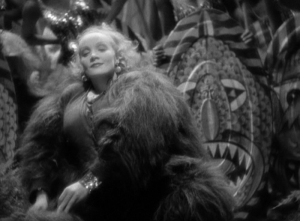 |
 |
 |
 |
|




4 Comments
jameswharris · September 15, 2014 at 1:32 am
Blonde Venus has always been my favorite Marlene Dietrich film. It’s also my favorite Josef Von Sternberg film. Sure it has problems, but also has all the qualities of why I love old 1930s movies. To me, there’s another reality that exists late at night, in the flickering light of a black and white movie. Between art, style and glamour, Blonde Venus creates a fantasy out of gritty reality that is both surreal and super-real.
Danny · October 8, 2014 at 6:51 pm
That’s a great way of putting it, James. Blonde Venus is a weird little fairy tale, perfect for a late night viewing. I always saw screenshots of it but never really read much until I wrote this review, and I was surprised how smart and beautiful the movie is.
Alisa (Li) Rivera (@lirivera) · September 22, 2014 at 11:06 am
I saw this film a long time ago but I seem to recall a gay character who befriends Dietrich when she’s on the run and then betrays her when he’s threatened with jail. Am I hallucinating this? Is it from another movie?
Danny · October 8, 2014 at 6:54 pm
I don’t remember that at all, I’m afraid, and have no idea what it’s from. Sorry!
Comments are closed.